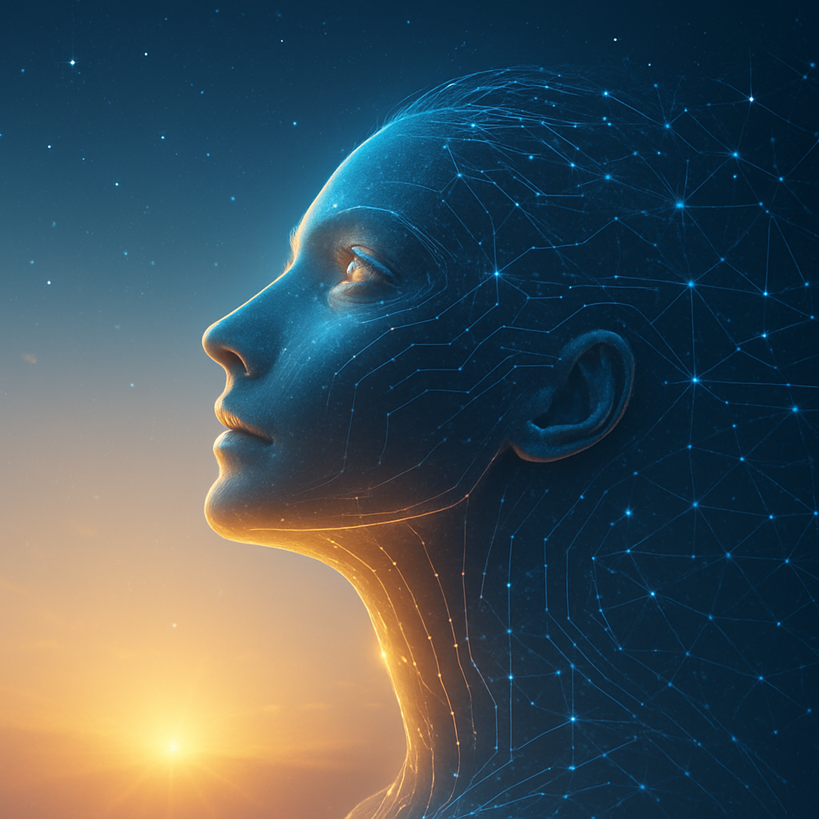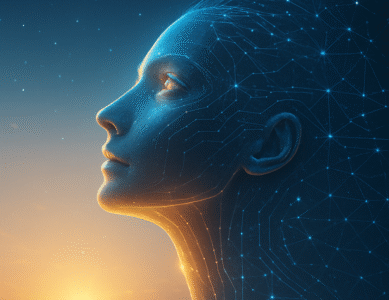The First Shock
When I first found out about OpenAI, I remember feeling both fascinated and fearful in equal measure. It felt as though the era of human dominance and uniqueness was quietly being ushered out. As if a gift entrusted to us for millennia was finally being recalled.
In the distance, I could almost hear a calm yet commanding voice, like that of a parental authority, declaring: “Time’s up. I’m taking it back. Toute suite.” Back, meaning the gift. The gift, meaning human uniqueness. When? Right now.
I imagined each word punctuated by a slow, emphatic tap of an index finger on an invisible table, accompanied by a gaze that made you sit up straighter.
“But why?!” I protested. All the great literature, the poetry, the infinite creations. Children born of our minds, hands, and toil: running across the earth, building civilizations, shaping meaning from the dust. Have we been deemed, in the end, unfit? Unworthy? Did we fail to rise to the full extent of our potential?
Watching, in the earlier days, ChatGPT on YouTube draft an essay on the Iranian Revolution in Donald Trump’s speaking style was hilarious; until I imagined a full novel ghostwritten in the style of Stephen King or Milan Kundera. If style can be cloned, what becomes of originality?
Could someone outsource an entire book to AI, put their name on it, and enjoy unearned acclaim? Worse, AI doesn’t play fair. It draws on the entire body of knowledge available to it, from every poem to every dataset, and turns it against the limits of a single human mind. How do we compete with a rival that is, by its very design, playing with an unfair advantage?
Why Learning Still Matters in the Age of AI
We live in an era where AI can write essays, solve math problems, generate code, and even simulate emotional conversations. Understandably, some begin to wonder: if AI can do all this, what’s the point of learning?
But that question rests on a misconception. Learning has never been just about collecting information. It’s not about memorization or regurgitation. Real learning is about how you think, how you connect ideas, and how you apply them in the messy, complicated reality of life. It’s about understanding context, mastering nuance, and applying judgment, especially when there is no single correct answer. And of course, the highest form of knowledge: wisdom.
Modern education theory emphasizes teaching how to think, not just what to know. Critical thinking, media literacy, and information discernment are now core goals in most advanced curricula. Hence, the greatest gift a teacher can give a student is not knowledge itself, but the ability to think: how to question, discern, and navigate the overwhelming sea of information now available at our fingertips.
Beyond Redundancy: AI and the Future of Human Work
We’re witnessing more than a trend. The rapid advancement of AI isn’t just another innovation cycle. Some have called it a civilizational turning point.
Of course, every major technological advancement has reshaped labor. Machines replaced muscle. Computers replaced paper. The internet rewired how we communicate. I still remember the hulking telex machine in my grandfather’s office. Only one man, Mr. Jbeili, was allowed to operate it. After he passed away, my grandfather never used it again. It wasn’t just about function; it was about trust, skill, and presence.
But AI is different. It doesn’t just change the tools we use, it changes the space we thought only human minds could occupy. It enters the realm of analysis and even creativity, touching areas we once believed were uniquely us. This moment isn’t just another chapter in the story of labor. It may be the first time we’ve had to ask whether machines can share in what makes us human, and if so, what’s left that only we can do.
Automating Tasks Is Not the Same as Replacing Jobs
A common misunderstanding in the AI conversation is the conflation of jobs with tasks. Jobs are multi-dimensional. They involve coordination, context, ethics, decision-making, and human relationships. AI can automate individual tasks within a role, like generating a report, analyzing data, optimizing ad spend, or summarizing a meeting, but that doesn’t necessarily eliminate the role itself.
Take a Marketing Manager. Their responsibilities may span campaign planning, brand development, channel strategy, budgeting, content review, and team coordination. AI can assist with some of these like generating headlines, analyzing ad performance, segmenting audiences, but it doesn’t replace the full picture. A manager still has to balance priorities, align cross-functional teams, respond to shifting market dynamics, and make judgment calls that reflect brand identity, timing, and cultural nuance. These are not decisions made in spreadsheets. They require context, experience, and human insight.
If you’ve ever seen one person leave and get replaced by three, you already understand this.
The Human Element Isn’t Optional
We don’t show up to work as cognitive calculators. We show up as whole people bringing emotion, experience, ethics, instincts, memories, culture, and sometimes even pain. When I sat in my dental surgeon’s chair shaking from the past trauma of a botched surgery performed by another doctor, what helped me wasn’t just his technical skill. It was his presence, and my trust in his capability, and in his integrity. I kept repeating to myself, ‘I trust you, I trust you’ to calm myself down. His wife, also a dentist, held my hand the entire time. That’s not something you can code.
When you call your bank about a fraudulent transaction, you don’t want a voice assistant, you want reassurance. When you pitch a strategy to a board, you don’t just deliver data, you read the room. Empathy, timing, and trust aren’t “soft skills.” They’re human infrastructure.
AI cannot simulate six-level consequence thinking. Military commanders weigh the long-term ripple effects of their decisions: tactically, operationally, and strategically. That’s a model of leadership built on wisdom, not just intelligence. It requires emotional intelligence, intuition, and moral reasoning, none of which can be delegated to a machine.
There’s the What, and Then There’s the How
Modern AI can mimic reasoning. It can optimize, and predict. But what sets humans apart is not our capacity to process. It’s our capacity to choose wisely. To navigate ambiguity. To act not just efficiently, but ethically. When humans take on roles, we bring a lifetime of context: cultural understanding, family values, faith, civic responsibility, and the lessons of past generations. We weigh trade-offs. We persuade. We adapt. We course-correct when something doesn’t feel right.
This is why collaboration depends on more than competence. It requires trust. Strategy requires more than analysis. It demands buy-in. And leadership requires more than knowledge. It needs wisdom.
We Don’t Know What We Don’t Know
And here’s the deeper problem: We don’t know what we don’t know. AI can give you a polished answer, but it will not question its own limits. It will not prompt you to explore the unexpected, challenge a prevailing assumption, or connect dots that don’t yet exist in its training data. That kind of thinking, that spark of curiosity and critical doubt, is still uniquely human.
Months ago, while writing about meaningful work, I asked an AI assistant to identify which of Dr. Nathaniel Branden’s books, the Canadian psychologist known for his work on self-esteem, explored the topic. It returned several accurate titles but missed the one I actually needed: The Psychology of Pleasure, where he argued that work isn’t just about income, but about identity and meaning. That omission mattered. Without my own familiarity with Branden’s work, I might not have noticed what was missing.
AI can give you answers, but it cannot tell you which one is grounded in twenty years of best practice, or in over twenty-six years of your own experience of dealing with people, learning from others, anticipating challenges specific to your environment, and planning for them with foresight.
“There is no expedient to which a man will not resort to avoid the real labor of thinking.” – Sir Joshua Reynolds
And here’s the risk: Before AI, we Googled, we compared, we cross-checked. We thought. Today, too many people treat the first response from an AI language model as the final word. That’s not learning; it’s outsourcing thinking. In the age of AI, speed is overrated. Depth matters more. Machines go wide, but you have to go deep. It’s not enough to skim ideas; you need to wrestle with them, challenge them, and shape something that carries your imprint and comes from lived experience.
The Edge That Remains Human
Knowing how something works, at its core, is what allows us to question it, improve it, and adapt it.
AI tools can generate a pay scale or a process map in seconds. But those who have built them from scratch can spot inconsistencies, refine outputs, and tailor solutions to real-world complexity. Manual skill isn’t about rejecting technology; it’s about maintaining clarity in a world that’s getting shaped by it.Those who understand the mechanics can troubleshoot when things go wrong, improve upon the generic, and adapt across tools and platforms. Principles don’t expire, and they’re what carry us when systems change.
In my view, professionals who pair domain expertise with AI fluency will likely hold a strong competitive advantage in many professions within the employment market of tomorrow. They’ll know when to trust a tool, when to challenge it, and when to set it aside entirely.
Tools are only as valuable as the ideas they serve and the mind that applies them. And that mind, sharpened by theoretical understanding, years of experience and practical application, and deep contextual awareness, anchored in judgment stemming from the wisdom of real-life experience, remains irreplaceably human.


